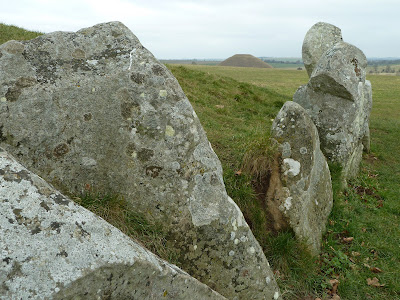 |
| The barrow entrance viewed from an inner chamber. |
Wiltshire is rich in prehistoric neolithic sites, and last week we took a walk to West Kennet Long Barrow, an chambered, burial long barrow on the ridge of a hill. Evidence suggests that it was in use from 3600 BC until 2500 BC and contained the burials of about 50 people, ranging from babies to old people. The barrow is the longest in Britain at approx 100m in length. The photo right was taken from the second burial chamber, all the cambers coming off a central walkway. The barrow has been damaged by indiscriminate digging in past centuries, and only the first few metres and five small chambers can be viewed. Huge sarsen stones originally sealed the entrance, but now access is via a gap behind the biggest stone. The finds from this site are now in Devizes Museum, photos of which can be seen on the previous blog page. A detailed account of this barrow and its artefacts please read on: www.wikipedia.org/wiki/West_Kennet_Long_Barrow
 |
| The entrance to the Long Barrow with its large stone which once sealed the entrance to the tombs. |
It was half term last week, and so a series of families with schoolchildren and dogs made their way uphill to visit the barrow. This family is enjoying the magnificent views of the Wiltshire landscape from the top of the chambered tomb.
 |
| A distant Silbury Hill viewed through the stone entrance of West Kennet Long Barrow. |
Silbury Hill, the great enigmatic mound can be seen between the stones of the barrow's entrance. This artificial hill has been excavated on several occasions, and was recently infilled to prevent its collaspe. It is judged to be 4,500 years old, and was completed in 2,500 BC, evidence gained from the remains of seeds and insects. It was once possible to climb to the top of Silbury, something I did on a wet and windy evening in the mid 1970's, and very creepy it was too. The following website contains interesting information about the Avebury area: www.avebury-web.co.uk/silbury_hill.html
The view of the hill below, was taken from the bank of the once clear flowing River Kennet, which now, because of water extraction has dried up. I remember it as a rippling stream that attracted flowers and butterfies, and which must have provided water for the primitive families who lived on these sites at Avebury. It is rather sad to see the now dead river bed.
The view of the hill below, was taken from the bank of the once clear flowing River Kennet, which now, because of water extraction has dried up. I remember it as a rippling stream that attracted flowers and butterfies, and which must have provided water for the primitive families who lived on these sites at Avebury. It is rather sad to see the now dead river bed.
 |
| Silbury Hill with the dried up River Kennet in the foreground. |
No comments:
Post a Comment